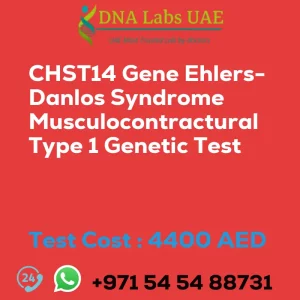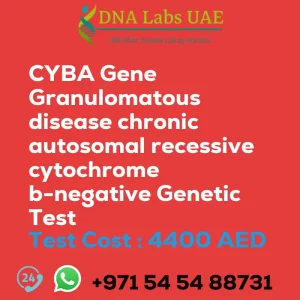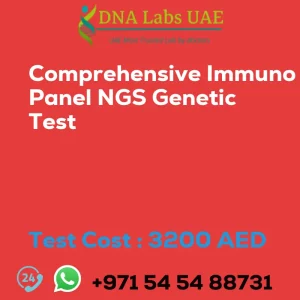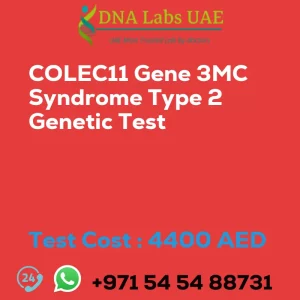KRT1 Gene Epidermolytic hyperkeratosis Genetic Test
Test Name: KRT1 Gene Epidermolytic hyperkeratosis Genetic Test
Components: DNA Labs UAE
Price: 4400.0 AED
Sample Condition: Blood or Extracted DNA or One drop Blood on FTA Card
Report Delivery: 3 to 4 Weeks
Method: NGS Technology
Test Type: Osteology Dermatology Immunology Disorders
Doctor: Dermatologist
Test Department: Genetics
Pre Test Information: Clinical History of Patient who is going for KRT1 Gene Epidermolytic hyperkeratosis NGS Genetic DNA Test. A Genetic Counselling session to draw a pedigree chart of family members affected with KRT1 Gene Epidermolytic hyperkeratosis NGS Genetic DNA Test gene KRT1
Test Details: The KRT1 gene is responsible for providing instructions to make a protein called keratin 1, which is important for the structure and function of the skin. Mutations in the KRT1 gene can cause a rare genetic disorder called epidermolytic hyperkeratosis. Epidermolytic hyperkeratosis is an inherited condition characterized by thick, scaly skin that is prone to blistering and peeling. The condition typically appears shortly after birth or in early childhood and can affect large areas of the body. Other symptoms may include redness, itching, and increased sensitivity to heat.
NGS (Next-Generation Sequencing) genetic testing is a type of genetic test that can analyze multiple genes simultaneously. In the case of epidermolytic hyperkeratosis, NGS genetic testing can be used to identify mutations in the KRT1 gene, as well as other genes that may be associated with the condition. NGS genetic testing involves sequencing the DNA of an individual to identify any changes or mutations in specific genes. This can help in diagnosing epidermolytic hyperkeratosis and determining the genetic cause of the condition. It can also be used for carrier testing, prenatal testing, and to provide information about the risk of passing the condition to future generations.
It is important to note that genetic testing should be done under the guidance of a healthcare professional or genetic counselor who can help interpret the results and provide appropriate counseling and support.
| Test Name | KRT1 Gene Epidermolytic hyperkeratosis Genetic Test |
|---|---|
| Components | |
| Price | 4400.0 AED |
| Sample Condition | Blood or Extracted DNA or One drop Blood on FTA Card |
| Report Delivery | 3 to 4 Weeks |
| Method | NGS Technology |
| Test type | Osteology Dermatology Immunology Disorders |
| Doctor | Dermatologist |
| Test Department: | Genetics |
| Pre Test Information | Clinical History of Patient who is going for KRT1 Gene Epidermolytic hyperkeratosis NGS Genetic DNA Test. A Genetic Counselling session to draw a pedigree chart of family members affected with KRT1 Gene Epidermolytic hyperkeratosis NGS Genetic DNA Test gene KRT1 |
| Test Details |
The KRT1 gene is responsible for providing instructions to make a protein called keratin 1, which is important for the structure and function of the skin. Mutations in the KRT1 gene can cause a rare genetic disorder called epidermolytic hyperkeratosis. Epidermolytic hyperkeratosis is an inherited condition characterized by thick, scaly skin that is prone to blistering and peeling. The condition typically appears shortly after birth or in early childhood and can affect large areas of the body. Other symptoms may include redness, itching, and increased sensitivity to heat. NGS (Next-Generation Sequencing) genetic testing is a type of genetic test that can analyze multiple genes simultaneously. In the case of epidermolytic hyperkeratosis, NGS genetic testing can be used to identify mutations in the KRT1 gene, as well as other genes that may be associated with the condition. NGS genetic testing involves sequencing the DNA of an individual to identify any changes or mutations in specific genes. This can help in diagnosing epidermolytic hyperkeratosis and determining the genetic cause of the condition. It can also be used for carrier testing, prenatal testing, and to provide information about the risk of passing the condition to future generations. It is important to note that genetic testing should be done under the guidance of a healthcare professional or genetic counselor who can help interpret the results and provide appropriate counseling and support. |








